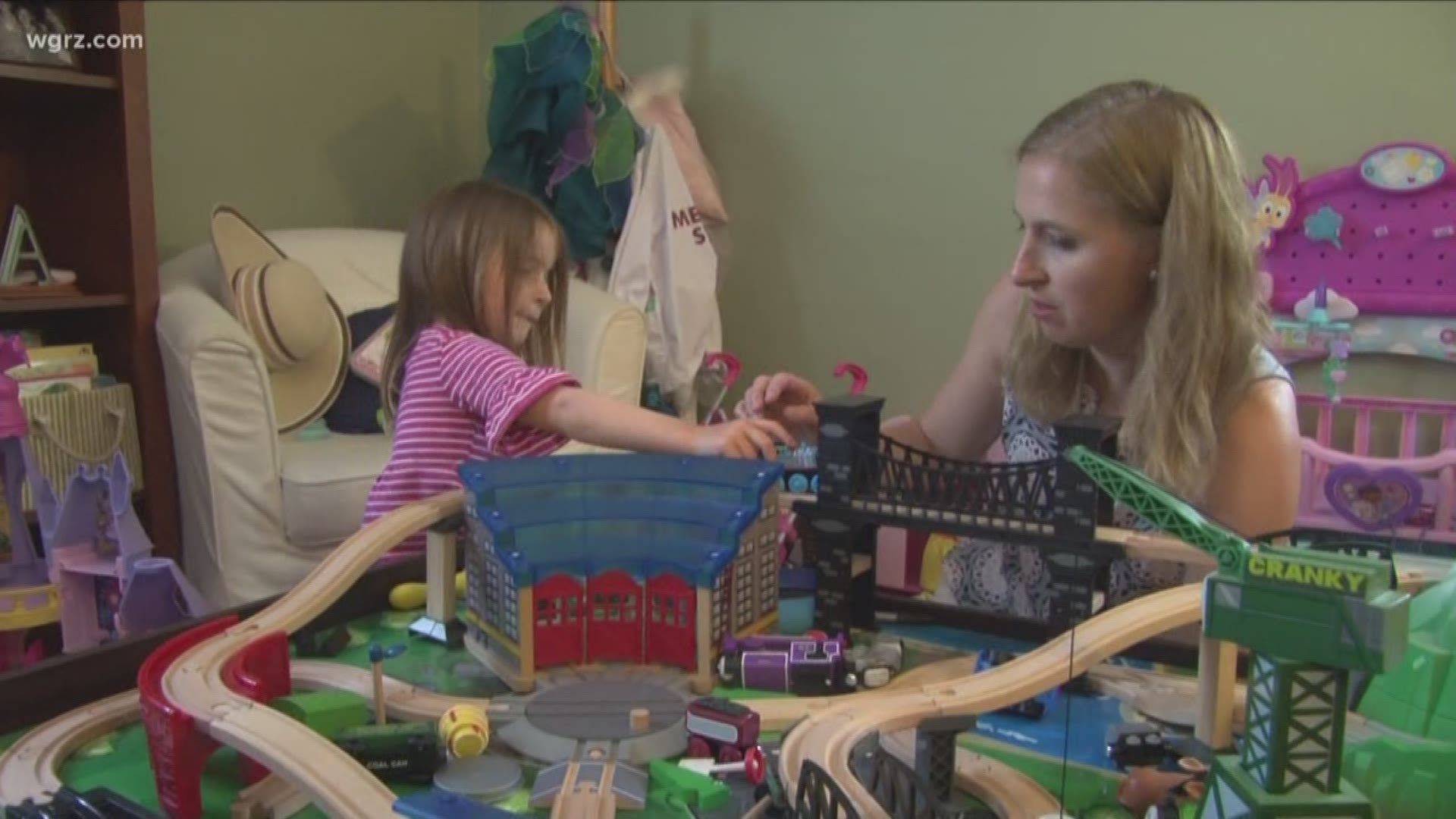NORTH BUFFALO, NY — Postpartum mental health disorders are some of the most common complications of child birth, but very few women talk about it or seek treatment. Now one mom from North Buffalo is bravely sharing her story to let other moms know, there is help and there is hope.
Note: Links to resources are found at the bottom of the article.
Kelly Fletcher has a close bond with her 4-year-old daughter, Grace, which is even more cherished because their relationship started in a dark and scary place.
"I wasn't really connecting with being pregnant. Every time someone would talk about me being pregnant I'd want to change the subject," said Fletcher.
At the time, she didn't realize she may have been experiencing signs of depression, which she was treated for 10 years earlier.
Fletcher's labor was long and difficult, she struggled with breastfeeding and she was sleep deprived.
"It was not that magical moment that you think of," said Fletcher. "Filling out all the paperwork for her birth certificate I was very irritable, crying all the time, and I didn't know why I was crying."
She was told by so many people that this was supposed to be the happiest time of her life, but for her, it wasn't. Fletcher said in the first few days after giving birth, she was uncontrollably crying and unable to coherently speak when talking with doctors, still no one recommended a depression screening. Her husband Mike noticed the change.
"Early on, in the first day or two, I thought, well, she just had a baby, she's probably going to be a bit abnormal for the first couple days, but it stuck around," he said. "She started having hallucinations and talking to people that were not in the room. That was when it was time to go see a doctor."
Fletcher said she never had thoughts of hurting herself or the baby, but her hallucinations were spiritual in nature. She also experienced manic episodes. Finally, she saw her primary physician, who said Fletcher needed to check herself into an inpatient psychiatric facility immediately, or she would have to act as a mandated reporter and possibly have the baby taken away.
Fletcher willingly sought inpatient care when Grace was 8 days old. She was diagnosed with postpartum psychosis, which is extremely rare. For the next 8 days, she was treated with anti-psychotics and was only able to see her daughter twice, for 15 minutes with supervision. Once discharged, Fletcher said the mania went away, but her medications made her feel numb.
She said even though she looked fine on the outside, she was far being cured. It was just like a physical illness, like a broken bone or cancer, mental illness takes time to heal.
"My mind is healing from a trauma, and outwardly I look fine, but I'm not," she said.
Now years later, Fletcher is sharing her story to help other moms just like her.
Clinical social worker Julie Rosinski says while Fletcher's postpartum psychosis is rare, 80 percent of women do suffer from the baby blues, and as many as 20 percent experience postpartum depression or a mental health crisis. Many can be helped by simply talking to a doctor or therapist.
"Usually if the baby blues aren't resolving within a couple of weeks and the symptoms seem to be getting worse (loss of interest in the baby, social isolation, crying a lot, anxiety feelings, any intrusive or scary thoughts) that could be a sign of something more significant going on," said Rosinski of the Wellness Spot of Orchard Park.
She said loved ones can help to spot the symptoms by simply asking a new mom how she's feeling.
"We're so focused on the baby. 'How's the baby doing? How's the baby sleeping? How's the baby eating?' Don't forget to ask mom, 'how are you doing?'"
There's no shame in talking to a professional, but for some reason there is a stigma surrounding postpartum depression and other mental health disorders and women are often afraid to come forward.
"They assume, and I think people often communicate to them, that this is supposed to be the happiest time of their lives. 'What do you have to be depressed about? You just had a new baby.' So there's a lot of shame attached to those thoughts and feelings," Rosinski said. "It's very common and it's very treatable so we want to communicate a sense of hope."
Fletcher said it took her about two and half years to feel fully healed, and now she's making it her mission to help others. She has this message for new moms:
"There's support out there and if you're feeling these symptoms, tell someone. Talk to someone about it. Don't be afraid."
Both Fletcher and Rosinski are members of the Western New York Perinatal Mood and Anxiety Disorders Task Force. They are hoping you'll join them for the "Climb Out of the Darkness Walk," a maternal mental health fundraiser for moms, dads and families. It is sponsored by Postpartum Support International and five countries, 115 teams, are participating. Team Buffalo's event is Saturday, June 23 at 10 a.m. at Outer Harbor State Park in Buffalo.
For more information about the event, click here.
To register for the walk, click here.
Postpartum Support International - click here. HelpLine- 1-800-944-4773 (available in English and Spanish)
Postpartum Resource Center of New York- Statewide resource directory- click here.
Western New York Postpartum Connection- Local resource directory- click here.
For a PDF of WNY resources, click here.

